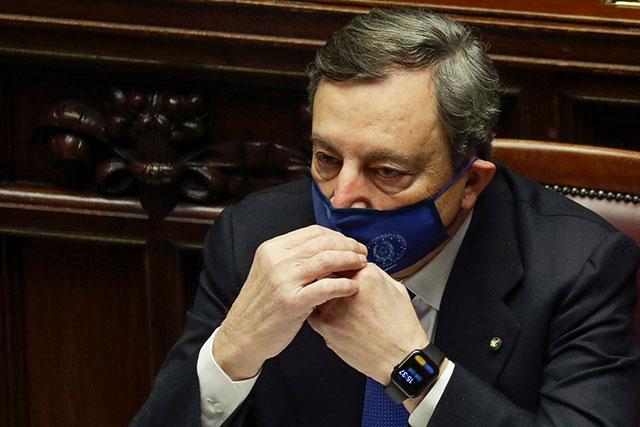- International News
- Friday-2021-02-19 | 02:57 pm

Nayrouz News Agency :
Italian Prime Minister Mario Draghi was set on Thursday to win the final parliamentary seal of approval for his government, allowing him to focus on his country's unprecedented health and economic crisis.
After securing the overwhelming support of the senate for his national unity government late Wednesday, the former European Central Bank (ECB) chief was lined up to obtain the backing of the lower house, the Chamber of Deputies.
Draghi is taking over at a particularly difficult time for Italy, where the coronavirus pandemic has killed almost 100,000 people and sent the economy plunging by a record 8.9 percent last year.
"There has never been in my long professional life a moment of such intense emotion and so much responsibility," the 73-year-old economist said in his inaugural speech at the senate.
The upper chamber late Wednesday backed the new government by a 262-40 margin, with two abstentions.
Given that nearly all parties support him, Draghi was expected to secure equally wide support in the lower house on Thursday evening.
He has pledged to use "all means" to fight the pandemic, starting with a faster vaccination programme. He also sketched out an ambitious reform plan, in line with European Union expectations.
Addressing the lower house, he said his government would have a "constantly forward-looking vision" which "I trust will inspire our common effort towards overcoming this health emergency and the economic crisis".
'Delicate negotiations'
The EU is set to help Italy's recovery with more than 200 billion euros ($240 billion) in loans and grants during 2021-2026, but in return expects the country to address long-standing structural issues.
Draghi has promised to reform Italy's stifling bureaucracy, labyrinthine tax code and snail-paced justice system, as well as focus on education, closing the gap on female employment and fighting climate change.
The ex-ECB chief was unexpectedly called in to solve Italy's political crisis two weeks ago, after the implosion of Giuseppe Conte's previous centre-left government.
The man known as "Super Mario" for helping save the euro while at the ECB has since won surprisingly wide political backing, including from the far-right, eurosceptic League of Matteo Salvini.
"Me and the League have complete confidence in your government," Salvini said in the Senate debate, after Draghi warned that supporting him also meant signing up to a more integrated EU and the idea that the euro single currency is irreversible.
Uneasy mix
The ruling coalition also includes the formerly anti-establishment Five Star Movement (M5S), the centre-left Democratic Party (PD), and the parties of ex-premiers Silvio Berlusconi and Matteo Renzi.
The mix is an uneasy one, especially for the M5S. Fifteen of its senators rebelled on Wednesday and voted against the new government, and were told on Thursday they would be expelled.
According to Wolfango Piccoli, co-president of the Teneo consultancy, Draghi will need "delicate negotiations to persuade his political backers" to implement his reform agenda.
Parties have "traditionally pursued policies radically opposed [to Draghi's ideas] on multiple fronts, including the role of the state in the economy, corporate interventionism and taxation", he said.
So, his "first 100 days in office should provide a good sense of what is achievable or not, especially concerning reforms that have been side-lined for decades", Piccoli concluded













